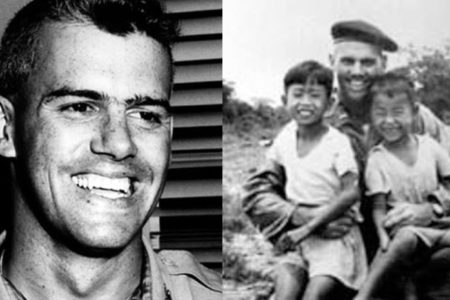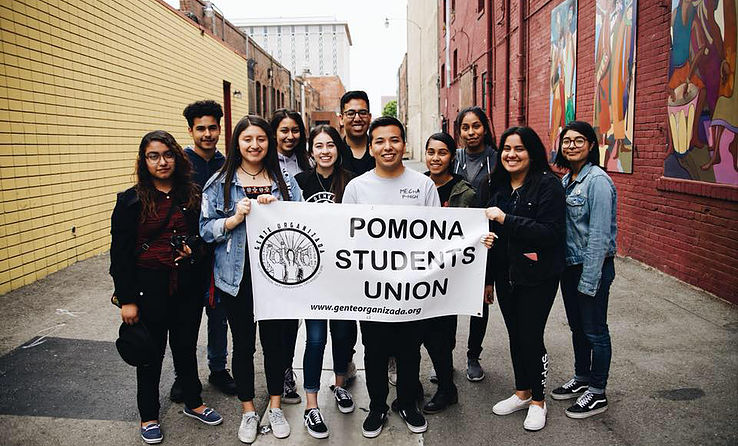
Share On Social!
Thanks to the efforts from the student-led community organization Gente Organizada, Pomona Unified School District will no longer allow police patrols to monitor campuses.
The decision comes after years of campaigning against discriminatory practices by school police, which was amplified after the racial justice protests of 2020.
Removing school police means Latino youth are safer from discrimination in school, as Pomona (71% Latino), a city in Los Angeles County, is home to many Latino and immigrant families.
“This is a milestone that has been met,” said Caroline Lucas, a Pomona youth organizer, according to Los Angeles Times. “For me, it means that leaders can experiment with what transformative activists have been trying to do.”
A Campaign Sparked by an Act of Violence
Latino youth in Pomona and law enforcement often had a relationship fraught with distrust and anxiety.
It came to a breaking point in 2015, when Pomona police officers assaulted a 16-year-old Latino boy at the Los Angeles County Fair.
The officers were charged with assault of a minor, preparing false reports that justified the use of violence, and obstruction of justice.
But they were later acquitted of all charges.
The anger and hurt from this event fueled a campaign to remove police from schools, said Jesus Sanchez, co-founder of Gente Organizada, in an interview with Salud America!
“That violent assault sort of sparked this campaign,” Sanchez said. “The students know that these officers are on their school campuses. They see them.”
Gente Organizada is a student-led activist group that serves the Latino immigrant community in Pomona.
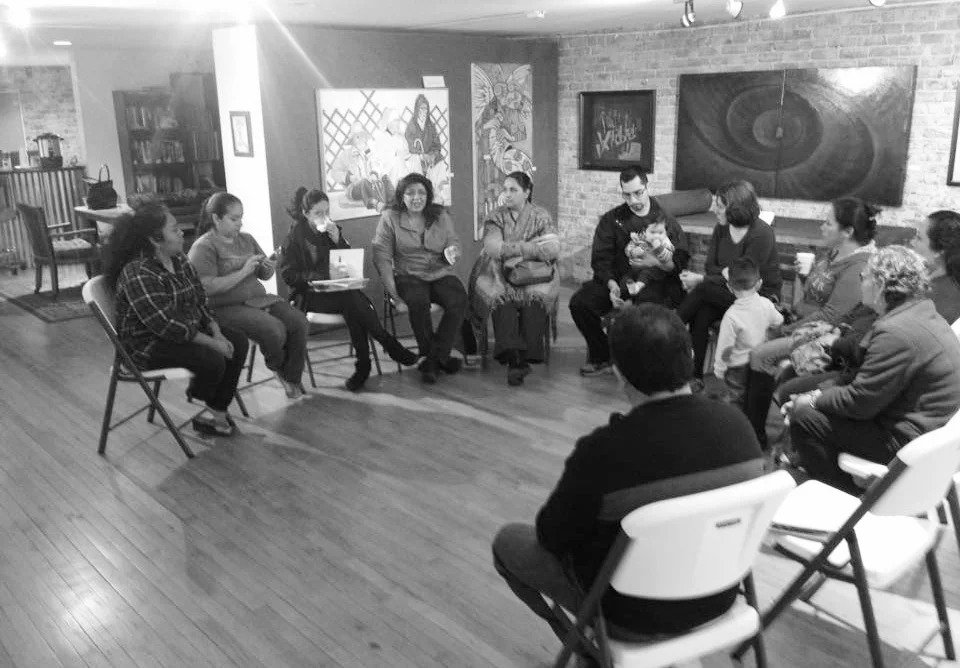
“A lot of families around here come from immigrant backgrounds,” Sanchez said.
Many immigrants in Pomona live in fear of being deported by Pomona police, according to Sanchez.
Seeing police officers on school campus was often stressful and traumatic for Latino immigrants.
The experience isn’t unique to Pomona.
Unfortunately, research shows that Latino youth are disproportionately targeted by school personnel.
“Children of color are often treated differently by school personnel; they are more likely to be harshly punished for minor infractions, and teachers may underestimate their abilities,” according to a Salud America!’s research review.
This can then lead to declining mental health for Latino kids, particularly for those who drop out or are kicked out of school.
“Lower educational attainment among Black and Latino students is linked to an increased risk of institutionalization, poorer physical and mental health, and reduced lifetime earning/economic potential,” according to a Salud America!’s research review.
Sanchez said that these discriminatory encounters that Latino students have with police in schools contributes to the “school-to-prison pipeline,” where students of color are disproportionately sent into the criminal justice system rather than continue their education.
Sanchez and the other community organizers wanted to put a stop to this discrimination and get police presence out of their schools.
Gaining Momentum in 2020
In 2020, Gente Organizada saw the national racial awakening bolster their efforts.
“Even though students weren’t in schools because of the pandemic, we saw how the protests amplified our efforts,” Sanchez said.
They still were able to gather support for their initiative online through social media.
Gente Organizada also joined the national racial justice effort by organizing protests to hold city officials and the police department accountable.
On June 5, 2020, Gente Organizada joined with a grassroots community effort of young Pomona residents and activists to march to Pomona Mayor Tim Sandoval’s home.
“The demand from the group to the Mayor was simple; [Pomona Police Department] needs civilian oversight, and leaders need to take a closer look at the interactions between PPD and young residents of color,” according to a report from Gente Organizada.
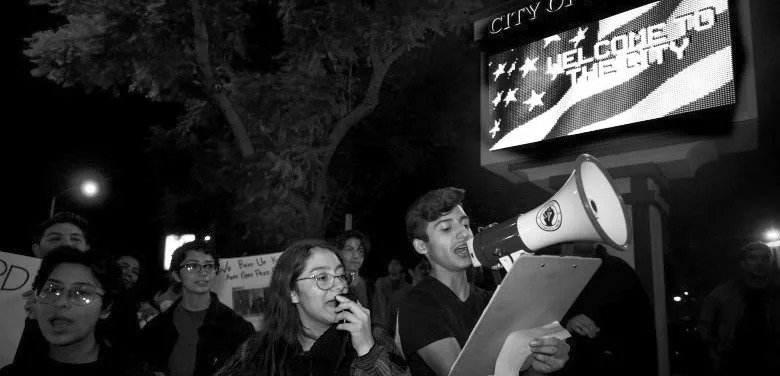
In 2020, Gente Organizada also partnered with the American Civil Liberties Union of Southern California (ACLU SoCal), which often supports local efforts to challenge discriminatory practices.
Together with Gente Organizada, ACLU SoCal sued the Pomona Police Department for using public funds for police lobbying training and violating a California state law to prevent the use of deadly force.
“This action is about challenging a corrupt police state that actively kills with impunity, profiles our Black residents, and upholds white supremacy in Pomona,” said Sanchez, according to an ACLU SoCal press release. “The pillaging of our resources has to stop; our elected officials are doing nothing to reclaim our resources because they are beholden to the Pomona Police Department.”
This partnership also led to Sanchez and his team collecting data from the police department to present to the city to prove their discriminatory practices.
Presenting Data to the City
Sanchez and his team began collecting data by requesting public records on arrests during January 2016 to June 2020 from the police department.
“The first request of data was on July 6, 2020 via email communication by Gente Organizada staff directed to the Pomona Chief of Police. The request was granted, and data was provided on July 8, 2020. The second request of this data was on July 26, 2020 via email communication by Gente Organizada staff directed to the PPD Records Manager. This request was granted, and data was provided on July 27, 2020,” according to a report from Gente Organizada.
Then together with ACLU SoCal, they analyzed the data through Microsoft Excel and the software R to see trends in police arrests.
Gente Organizada found the following trends, listed in their report:
- Latino youth are arrested more frequently and charged with harsher consequences.
- Black and Latina female youth account for 88.9% of all female youth arrested, despite representing only 77.3% of Pomona’s population.
- Latino and Black male youth account for 91.3% of all male youth arrested, despite representing 77.3% of Pomona’s population.
- 4% of all Latino youth arrested are charged with a felony, which is significantly greater than each of the other racial categories except for Asian youth. This is especially significant because Latino youth make up 70% of all youth arrests.
After compiling the data and publishing the report in March 2021, Gente Organizada presented their findings to the school board in April 2021.
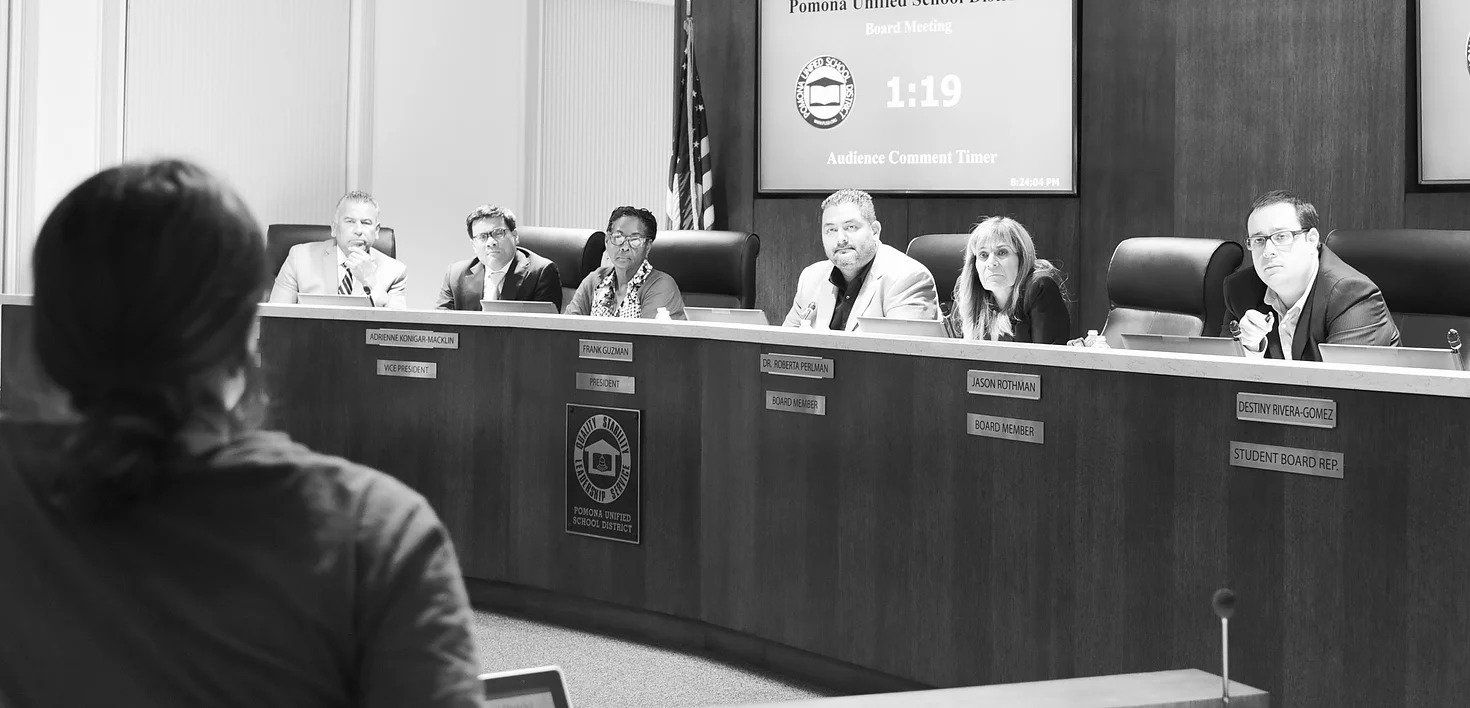
Among other requests for transparency and accountability for the police department, they asked the school board to end their contract with the Pomona police and remove officers from schools.
“Remove the Pomona Police Department from schools and eliminate PPD youth services. Pomona PD is not trained or designed to work in education or youth development spaces. Thus, the removal of school police officers will be a step towards dismantling the school-to-prison pipeline and supporting the reallocation of youth resources to services that genuinely benefit young people (i.e., counselors, mental health providers). The city must address the fact that Pomona PD has more earmarked youth services funds than the Neighborhood Services Department. We must honor our youth by earmarking funds for them that will be managed by youth development professionals,” according to the report from Gente Organizada.
The school board for the district had, as of 2019, budgeted $366,000 to fund two police officers to monitor schools.
On June 30, 2021, the school board voted on a new budget that did not allocate funds to the police department.
“Instead, the money will fund resources to help students after a year of remote schooling,” said Superintendent Richard Martinez, according to Los Angeles Times. “Our focus has been about reengaging students and making sure that they’re ready to come back to school.”
Gente Organizada and ACLU SoCal were relieved their efforts were successful.
“Educators acknowledge that the fight to remove school police is part of the fight for racial justice,” said Amir Whitaker, senior policy counsel for ACLU SoCal, according to Los Angeles Times.
What Happens Next? Alternatives to Policing
Without a police presence, some wonder what alternatives will be put in place for school discipline.
The Pomona Unified School District will rely on proctors, who are unarmed parents and recent graduates, to de-escalate conflicts in schools.
Sanchez supports the increase in mental health counselors and social workers, but questions why police need a replacement.
“I think it’s great to have more counselors and social workers to deal with mental health issues, but I don’t think we need a replacement for police, because what purpose were police serving on campus in the first place?” Sanchez said.
Other cities like Chicago are leaning into restorative justice programs rather than school discipline, as it provides holistic healing and focuses on the root causes.
Even programs like the Tobacco-Free Schools Initiative from the Alliance for a Healthier Generation have found that focusing on restorative justice is better for students than discipline when it comes to tobacco usage in schools.
The debate about policing and school discipline will be ongoing for some time, as schools and parents navigate the best way to keep students safe from discrimination in schools.
What Can You Do?
If you want to make a difference in your community, you can sure your city understands how racism and public health are intertwined.
Decades of racism-infused social, economic, and political systems have led to inequitable communities. These areas face higher burdens of stress, disease, and premature death.
As the protests for racial/ethnic and social justice continue, city leaders are creating resolutions that declare racism a public health crisis and commit to action.
Download the free Salud America! “Get Your City to Declare Racism a Public Health Crisis Action Pack.”
The Action Pack will help you get input from local social justice groups and advocates of color, start a conversation with city leaders, and build local support for a resolution to declare racism a public health issue along with a commitment to take action to change policies and practices.
Explore More:
Increasing RecognitionBy The Numbers
3
Big Excuses
people use to justify discriminatory behavior

